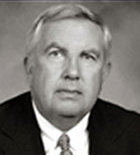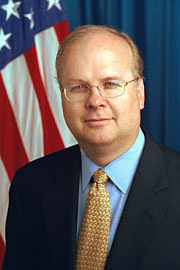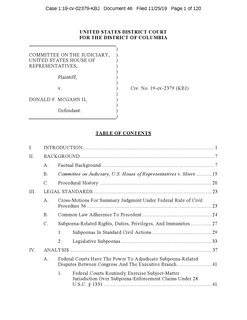
Lawrence Ari Fleischer is an American media consultant and political aide who served as the twenty-first White House Press Secretary, for President George W. Bush, from January 2001 to July 2003.
Executive privilege is the right of the president of the United States and other members of the executive branch to maintain confidential communications under certain circumstances within the executive branch and to resist some subpoenas and other oversight by the legislative and judicial branches of government in pursuit of particular information or personnel relating to those confidential communications. The right comes into effect when revealing information would impair governmental functions. Neither executive privilege nor the oversight power of Congress is explicitly mentioned in the United States Constitution. However, the Supreme Court of the United States has ruled that executive privilege and congressional oversight each are a consequence of the doctrine of the separation of powers, derived from the supremacy of each branch in its own area of Constitutional activity.

Fred Fisher Fielding is an American lawyer. He held the office of White House Counsel for US Presidents Ronald Reagan and George W. Bush in addition to serving as an Associate and Deputy White House Counsel for Richard Nixon under John Dean. Fielding was also of counsel to the presidential transition of Donald Trump.
In politics, opposition research is the practice of collecting information on a political opponent or other adversary that can be used to discredit or otherwise weaken them. The information can include biographical, legal, criminal, medical, educational, or financial history or activities, as well as prior media coverage, or the voting record of a politician. Opposition research can also entail using "trackers" to follow an individual and record their activities or political speeches. In advanced democracies, especially in Europe, some of the practices of "opposition research" would often be regarded as unethical or illegal and could be construed as stalking and harassment, especially the collection of information about family members or medical or other private information.

Daniel Joseph Bartlett was a Counselor to the President in the administration of George W. Bush. The position was previously held by Karen Hughes, who vacated the post in 2002. On June 1, 2007, Bartlett announced that would be leaving the White House on July 5. He was replaced by Ed Gillespie, the Republican gubernatorial nominee in Virginia in 2017.

Harriet Ellan Miers is an American lawyer who served as White House Counsel to President George W. Bush from 2005 to 2007. A member of the Republican Party since 1988, she previously served as White House Staff Secretary from 2001 to 2003 and White House Deputy Chief of Staff for Policy from 2003 until 2005. In 2005, Miers was nominated by Bush to be an Associate Justice of the Supreme Court of the United States to replace retiring Justice Sandra Day O'Connor, but—in the face of bipartisan opposition—asked Bush to withdraw her nomination.

On October 3, 2005, Harriet Miers was nominated for Associate Justice of the U.S. Supreme Court by President George W. Bush to replace retired Associate Justice Sandra Day O'Connor. Miers was, at the time, White House Counsel, and had previously served in several roles both during Bush's tenure as Governor of Texas and President.

John Deacon Bates is a Senior United States District Judge of the United States District Court for the District of Columbia. He was appointed by President George W. Bush in December 2001, and has adjudicated several cases directly affecting the office of the President. Bates served as Director of the Administrative Office of the United States Courts, from July 1, 2013 to January 5, 2015, after which he returned to full-time service as a District Judge.
On December 7, 2006, the George W. Bush Administration's Department of Justice ordered the unprecedented midterm dismissal of seven United States attorneys. Congressional investigations focused on whether the Department of Justice and the White House were using the U.S. Attorney positions for political advantage. Allegations were that some of the attorneys were targeted for dismissal to impede investigations of Republican politicians or that some were targeted for their failure to initiate investigations that would damage Democratic politicians or hamper Democratic-leaning voters. The U.S. attorneys were replaced with interim appointees, under provisions in the 2005 USA PATRIOT Act reauthorization.

Harry Earnest Cummins, III, known as Bud Cummins, is an attorney, businessman and politician. He served as United States Attorney with five years of service from 2001 to 2006 in the United States District Court for the Eastern District of Arkansas.
Monica Marie Goodling is a former United States government lawyer and Republican political appointee in the George W. Bush administration who is best known for her role in the controversy about the politically motivated firings of several United States Attorneys in 2007. She was the principal deputy director of public affairs for the United States Department of Justice, serving under Attorneys General John Ashcroft and Alberto Gonzales. A Department of Justice investigation concluded that she had violated the law, but she was not prosecuted because she had been granted immunity in exchange for her testimony. The Virginia State Bar publicly reprimanded Goodling in May 2011 for having "improperly utilized political affiliation and other political considerations when making hiring decisions for career positions."
A detailed chronology of events in the dismissal of U.S. attorneys controversy.
The various documents obtained by request or subpoena during dismissal of U.S attorneys controversy by both the United States House and Senate Committees on the Judiciary, originally produced by the Department of Justice (DOJ) or White House have been made available to the public and press via the two congressional judiciary committees' web sites. The documents received a great deal of attention in the United States press from March 2007 onward, and have been repeatedly cited or excerpted in news reports, editorials and analyses. The documents largely include copies of memoranda and email among leadership and key individuals within the United States Department of Justice, as well as key members of the Executive Office of the President, commonly termed White House.
The United States House Committee on the Judiciary and the Senate Committee on the Judiciary, have oversight authority over Department of Justice (DOJ). In 2007 it conducted public and closed-door oversight and investigative hearings on the DOJ's interactions with the White House and staff members of the Executive Office of the President. A routine oversight hearing on January 18, 2007 by the Senate committee was the first public congressional occasion that Attorney General Gonzales responded to questions about dismissed United States Attorneys (USAs). Both committees invited or subpoened past and present Department of Justice officers and staff to appear and testify during 2007, and both committees requested or subpoenaed documents, and made the documents that were produced publicly available.

Karl Christian Rove is an American Republican political consultant, policy advisor and lobbyist. He was Senior Advisor and Deputy Chief of Staff during the George W. Bush administration until his resignation on August 31, 2007. He has also headed the Office of Political Affairs, the Office of Public Liaison, and the White House Office of Strategic Initiatives.
Beth Nolan is a vice president and general counsel of the George Washington University. She was Bill Clinton's final White House Counsel. Prior to serving as White House Counicil, Nolan worked in other White House and Department of Justice positions, taught law, and worked in private practice.

Donald Francis McGahn II is an American lawyer who served as White House Counsel for U.S. President Donald Trump, from the day of Trump's inauguration through October 17, 2018, when McGahn resigned. Previously, McGahn served on the Federal Election Commission for over five years. In November 2019, McGahn received a court order to testify before the U.S House of Representatives. In August 2020, the United States Court of Appeals for the District of Columbia Circuit ruled 7–2 that the House can sue him to comply.

This is a timeline of events in 2019 related to investigations into links between associates of Donald Trump and Russian officials that are suspected of being inappropriate, relating to the Russian interference in the 2016 United States elections. It follows the timeline of Russian interference in the 2016 United States elections, both before and after July 2016, until November 8, 2016, the transition, the first and second halves of 2017, the first and second halves of 2018, and followed by 2020 and 2021.

The impeachment inquiry against Donald Trump, the president of the United States, was initiated by House Speaker Nancy Pelosi on September 24, 2019, after a whistleblower alleged that Donald Trump may have abused the power of the presidency. Trump was accused of withholding military aid as a means of pressuring newly elected president of Ukraine Volodymyr Zelensky to pursue investigations of Joe Biden and his son Hunter and to investigate a conspiracy theory that Ukraine, not Russia, was behind interference in the 2016 presidential election. More than a week after Trump had put a hold on the previously approved aid, he made these requests in a July 25 phone call with the Ukrainian president, which the whistleblower said was intended to help Trump's reelection bid.

In re: Don McGahn is a U.S. constitutional case lawsuit (1:19-cv-02379) filed in the United States District Court for the District of Columbia by the House Judiciary Committee to compel the testimony of former White House Counsel Donald F. McGahn, Jr. under subpoena. McGahn was put under subpoena to testify regarding his knowledge of the Russia investigation and Mueller Report and whether President Donald Trump's actions could constitute obstruction of justice. The case gained importance as the House launched impeachment proceedings against Trump regarding the Trump–Ukraine scandal.










